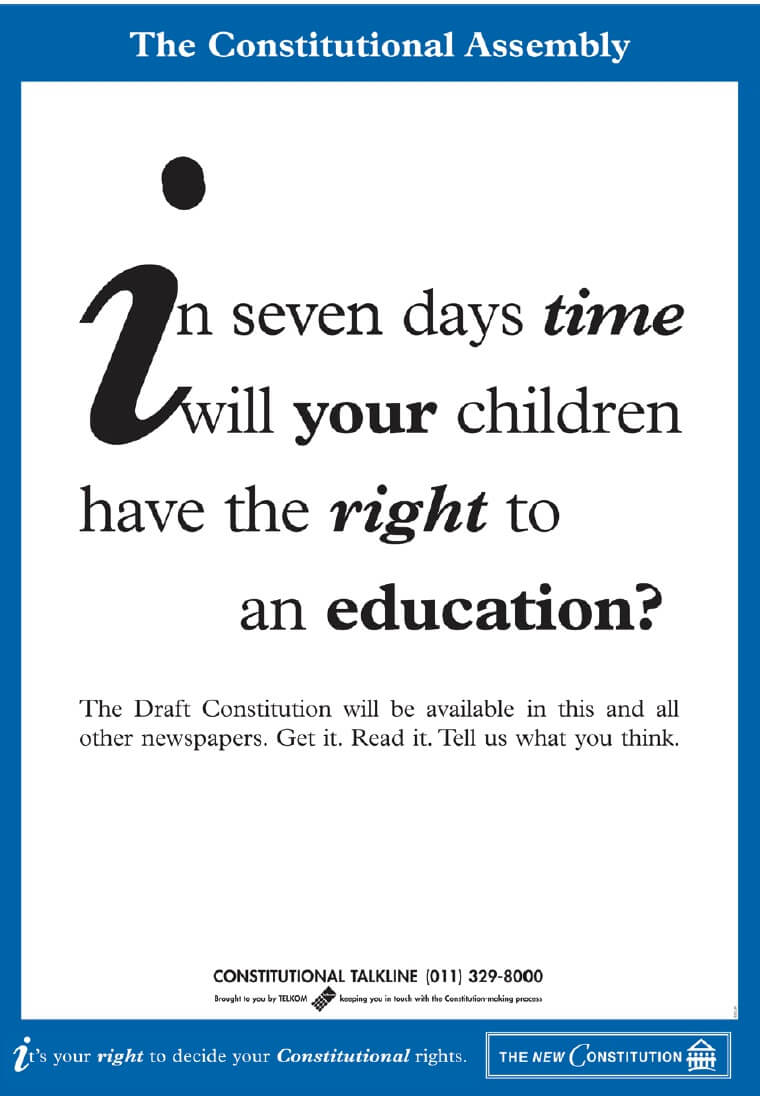7 DAYS AWAY
On 1 May, the Constitutional Committee began debating outstanding issues at two in the afternoon and ended at five o’clock the next morning, without reaching success. At this point there were real concerns that the Constitution would not be adopted on 8 May.
We are now in a danger zone. If we take a wrong turn in the next 24 hours, we could do something that we could regret for many months, possibly a number of years.
CYRIL RAMAPHOSA
then Chair of the Constitutional Assembly
Cyril Ramaphosa, Roelf Meyer and the smaller parties believed that if the deadlocked issues had to be resolved in a referendum, this would undermine the entire negotiation process:
If we ever go down that route, there are a number of implications for our country, economy, race relations, reconciliation. All sorts of things will start to become undone. The centre may not hold … I don’t believe we sat here for two years wasting our time, to go for a referendum.
Cyril Ramaphosa
then Chair of the Constitutional Assembly
A referendum would not have been good for the NP and it certainly would not have been good for the ANC … we are looking at agreeing on this Constitution through consensus rather than to fight it out in terms of voting on it or, even worse, going to a referendum.
Roelf Meyer
then NP member of the Constitutional Assembly
The ANC wanted to avoid having a referendum because it would show that they had failed, while the smaller opposition parties wanted to avoid having a referendum because they would have ended up with a worse Constitution.
Colin Eglin
then DP member of the Constitutional Assembly
In fact, the effect of a referendum would have been a constitution forced on minority parties by the massive popular support of ANC rather than a national constitution supported by the ANC. Many people in the DP and NP on the other hand, feared that numerous protections important to their constituencies that had been agreed to by the ANC, could be lost in a referendum where voters would be called upon to support pure ANC positions. For different reasons then, virtually all parties envisaged a referendum with dread. The consequences of a referendum could have been divisive, dramatic and drastic. The issue was not just one of vision. The issue was getting all sections and communities to accept the overriding authority of the Constitution for everyone in the country. In practical terms, it was far better to have right wing Afrikaners and Zulu nationalists inside parliament and acknowledging the new democracy then resorting to arms and sabotage outside. A referendum might break a negotiating deadlock. But it would also break the consensus needed to have one law for one nation.
What’s interesting about this phase is to see the National Party resolute at long last. On the single issue of education, they are displaying the kind of resolve which, had they displayed in respect of a few others that are not going to come out right, would have produced different results.
Sheila Camerer,
then NP member of the Constitutional Assembly
In the midst of all this, the negotiators still had the capacity to laugh. During several breaks, Cyril broke into a song by Louis Armstrong that he had been taught by Joe Slovo during CODESA. Together, they had crafted alternative words relating to the negotiations. ‘It kept us going during the Kempton Park negotiations and I was rather pleased to have it transposed into this process and to get a few people to sing along. It was wonderful to lighten things up a bit,’ enthused a smiling Cyril Ramaphosa.

